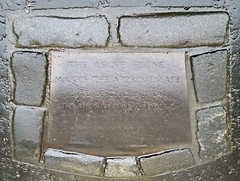John Knox


John Knox
(1514-1572)
Commemorated on 3 plaques
Near this spot stood the Manse in which lived John Knox 1560 - 1566
Warriston's Close, High Street, EH1 1PG, Edinburgh, United Kingdom where they lived near (1559-1565)
The above stone marks the approximate site of the burial in St Giles graveyard of John Knox the Scottish divine who died 24 Nov 1572
St Giles, High Street, Edinburgh, United Kingdom where they was buried near (1572)
J. K. 1572
car park, ex-burial ground of High Kirk of St. Giles, Edinburgh, United Kingdom where they was buried (1572)



